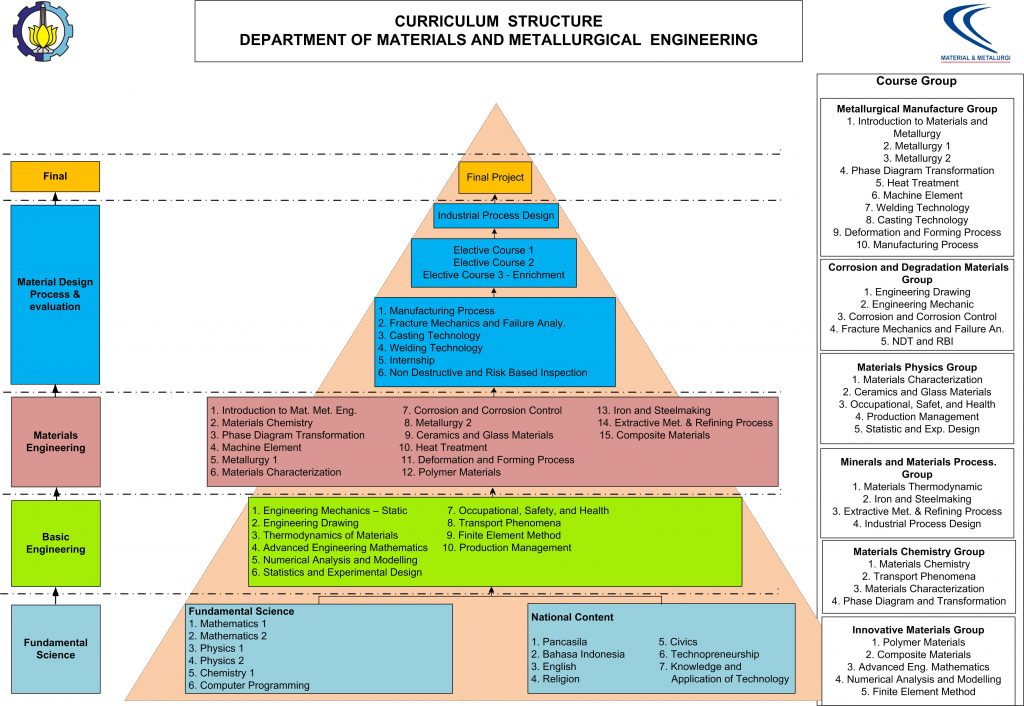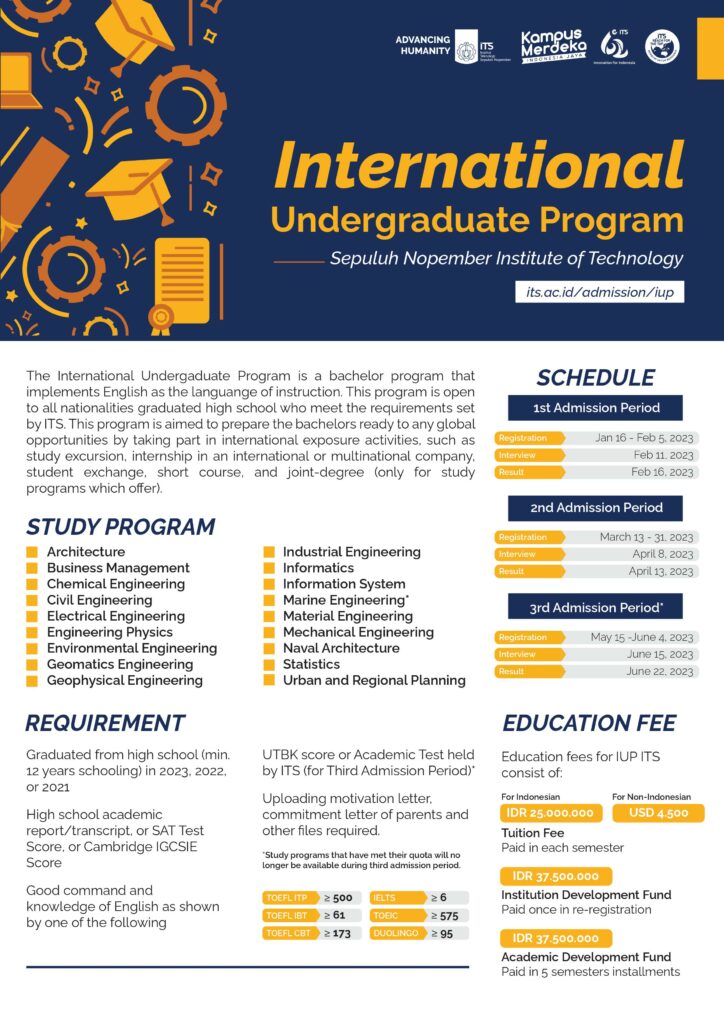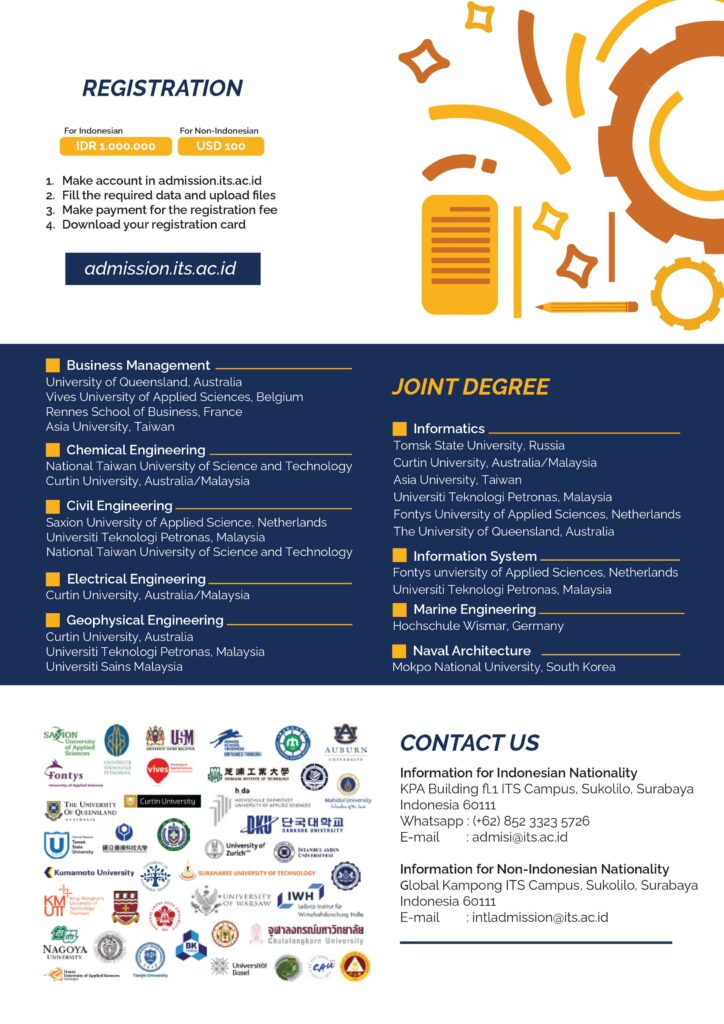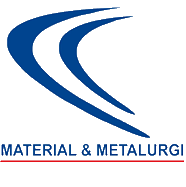International Undergraduate Program (IUP)
Institut Teknologi Sepuluh Nopember (ITS) merupakan salah satu perguruan tinggi terbaik di Indonesia, menurut penilaian Kementerian Riset, Teknologi, dan Pendidikan Tinggi (Kemristekdikti) Indonesia, serta masuk dalam 10 Universitas Terbaik di Indonesia pada kedua universitas tersebut. QS World University Ranking dan Times Higher Education (THE) World University Ranking. Dilengkapi dengan lingkungan hijau yang kondusif, lebih dari seribu staf akademik berkualifikasi tinggi, dan total luas 180 hektar, ITS memprioritaskan pendidikan, penelitian, penelitian yang unggul dan prima dan inovasi. Fakta menunjukkan banyak prestasi ITS yang diakui baik di tingkat nasional maupun internasional, di tahun 2019 ini ITS dengan bangga mencanangkan berdirinya 20 Program Sarjana Internasional untuk mahasiswa Indonesia bersama mahasiswa asing. Daftar berikut terdiri dari 20 Program Sarjana Internasional yang ditawarkan di Institut Teknologi Sepuluh Nopember. Departemen Material dan Teknik Metalurgi merupakan salah satu departemen di ITS yang memiliki Program Sarjana Internasional (IUP).
Departemen Teknik Material dan Metalurgi berada di bawah Fakultas Teknologi Industri dan Rekayasa Sistem, Institut Teknologi Sepuluh Nopember (ITS) Surabaya. Departemen Teknik Material dan Metalurgi memiliki visi menjadi departemen yang memiliki keunggulan, kompetensi global di bidang teknik dan teknologi material untuk mendukung perkembangan ilmu pengetahuan dan teknologi serta industri. Mahasiswa Departemen Teknik Material dan Metalurgi dipersiapkan menjadi manusia yang ahli dalam mendesain dan menganalisa kebutuhan material dan teknik metalurgi untuk organisasi, merancang pengembangan proyek dalam konteks material dan metalurgi dengan menggabungkan secara komprehensif menjadi material jadi dalam bentuk perangkat keras, perangkat lunak, jaringan, data, proses dan prosedur, yang terutama menghasilkan sumber daya manusia yang kuat dan terampil. Mahasiswa juga dibekali dengan keterampilan dasar dan kemajuan dalam penerapan pengolahan dan pengembangan material, infrastruktur jaringan, perawatan material logam hingga menjadi produk jadi yang dapat dimanfaatkan oleh masyarakat.
Program Internasional dan Kerjasama Internasional Dengan Jepang, Korea Selatan, Thailand informasi lebih lanjut selengkapnya disini
LEARNING OUTCOME
- LO A is the ability to solve materials engineering and metallurgical problems using science, technology, and mathematics.
- LO B is the ability to design components, systems, and processes for materials and metallurgical engineering based on engineering, economy, energy, environment, and sustainability.
- LO C is the ability to formulate decisions based on data analysis, information, experiments, and or practical experience.
- LO D is the ability to identify, analyze and formulate alternative solutions for materials engineering and metallurgy.
- LO E is the ability to apply modern tools for engineering design and analysis.
- LO F is the ability to communicate effectively, both orally and writing.
- LO G is the ability to plan, complete and evaluate tasks within existing constraints as needed.
- LO H is the ability to work in cross-disciplinary and cross-cultural teams nationally and internationally.
- LO I is the ability to be responsible to society and comply with professional ethics in solving problems in materials engineering and metallurgy.
- LO J is the ability to learn throughout life and understand complex problems.
AUTONOMOUS PROFILE OF MATERIALS AND METALLURGICAL ENGINEERING DEPARTMENT
- Individual who are able to solve problems in managing and utilizing local, national and global resources based on the principles of basic science and materials-metallurgical engineering
- Individual who has good moral personality and leadership, able to communicate and solving in task in organization considering profession ethics and other ethic
- Individual who is able to do continuous self improvement
- Education Implementation Survey click here
- Document of Survey Results for Alumni and Graduate Users, click here
- Tracer Study Data: Click Tracer Study Document here
FIELD OF GRADUATES
In the Undergraduate Program in the department of material engineering and metallurgy, there are 4 areas of expertise, namely:
- Extractive Metallurgy
- Manufacturing Metallurgy
- Corrosion and Failure
- Innovative Materials
CURRICULUM STRUCTURE

Curriculum 2018-2023
| Semester 1 Subject |
credit | Semester 2 Subject |
credit | |
| Indonesian | 2 | English | 2 | |
| Civics | 2 | Mathematics 2 | 3 | |
| Chemistry 1 | 2 | Pancasila | 2 | |
| Physics 1 + p | 2 | Physics 2 | 3 | |
| Mathematics 1 | 2 | Engineering Mechanics-Static | 2 | |
| Religion | 2 | Engineering Drawings + A | 3 | |
| Introduction to Materials and Metallurgical Engineering | 2 | Materials Chemistry + P | 3 | |
| Number of credit | 18 | Number of credit | 18 |
| Semester 3 Subject |
credit | Semester 4 Subject |
credit | |
| Materials Thermodynamics | 3 | Materials Characterization | 3 | |
| Computer Programming | 3 | Corrosion and Corrosion Control + P | 3 | |
| Phase Diagram and Transformation | 3 | Manufacturing Process + P | 3 | |
| Machine Design | 3 | Metallurgy 2 + P | 3 | |
| Metallurgy 1 + P | 3 | Numerical Analysis and Modeling | 3 | |
| Advanced Engineering Mathematics | 3 | Statistics and Experimental Design | 3 | |
| Number of credit | 18 | Number of credit | 18 |
| Semester 5 Subject |
credit | Semester 6 Subject |
credit | |
| Ceramics and Glass Materials | 3 | Technopreneurship | 2 | |
| Fracture Mechanics and Failure Analysis | 3 | Polymer Materials* | 3 | |
| Occupational Safety and Health | 3 | Iron and Steel Making | 3 | |
| Heat Treatment + P | 3 | Welding Technology + TB | 3 | |
| Casting Technology + TB | 3 | Finite Element Method | 3 | |
| Deformation and Formation Processes | 3 | Transport Phenomena | 4 | |
| Number of credit | 18 | Number of credit | 18 |
| Semester 7 Subject |
credit | Semester 8 Subject |
credit | |
| Concept of Technology | 3 | Industrial Process Design + TB | 3 | |
| Extractive Metallurgy and Refining Process + P | 3 | Final Project | 6 | |
| Production Management | 4 | Elective 3 * Enrichment | 3 | |
| Composite Material* | 3 | Elective 11 | 3 | |
| Internship | 2 | Elective 2 | 3 | |
| Non Destructive and Risk Based Inspection | 3 | Number of credit | 18 | |
| Number of credit | 18 |
FLYER IUP 2023


LIST OF CURRICULUM DOCUMENT
For course schedule, click here
Download Flyer IUP 2023 here
Download Curriculum Book 2014-2019 clik here
Download Assessment Method Plan 2018 clik here
Download Curriculum Book 2018-2023 clik here
Download Semester Learning Plan Book 2018-2023 clik here
Download Curriculum Development book 2018-2023 click here
Download Syllabus Curriculum Development 2018-2023 clik here
Download RPS Curriclum 2018-2023 clik here
Download Quality Assurance Guide clik here
Download Transfer Credit for International Exchange Program click here
Download the Lesson of Even Semester 2019/2020 here
Download Procedure for Assessment, Evaluation and Follow Up of Learning Outcomes here
Download letter of additional learning outcomes in the judicial process here
Download Syllabus Curriculum 2018-2023 here
